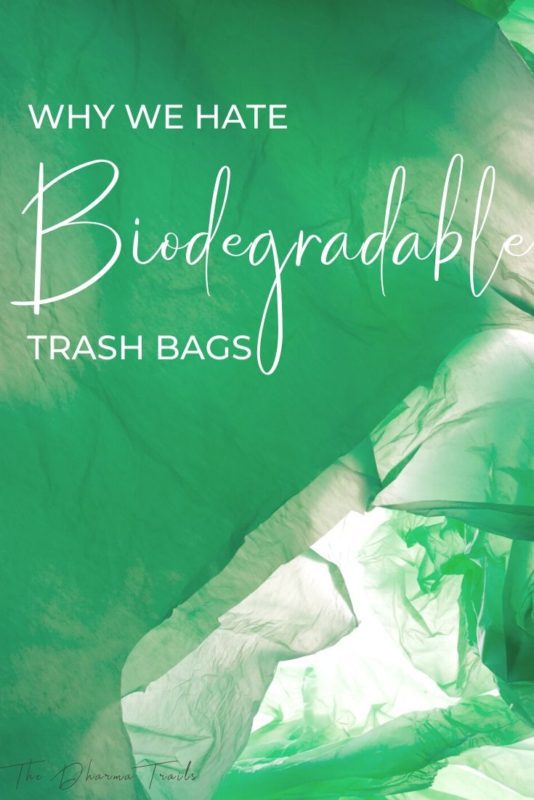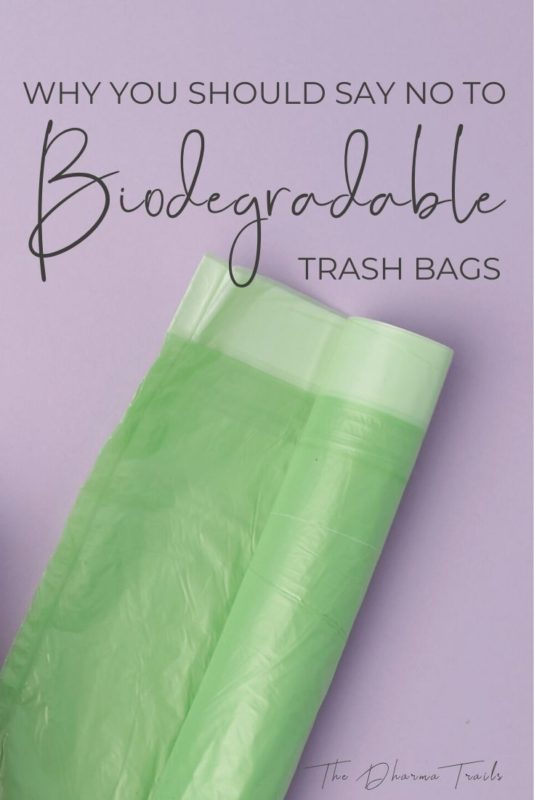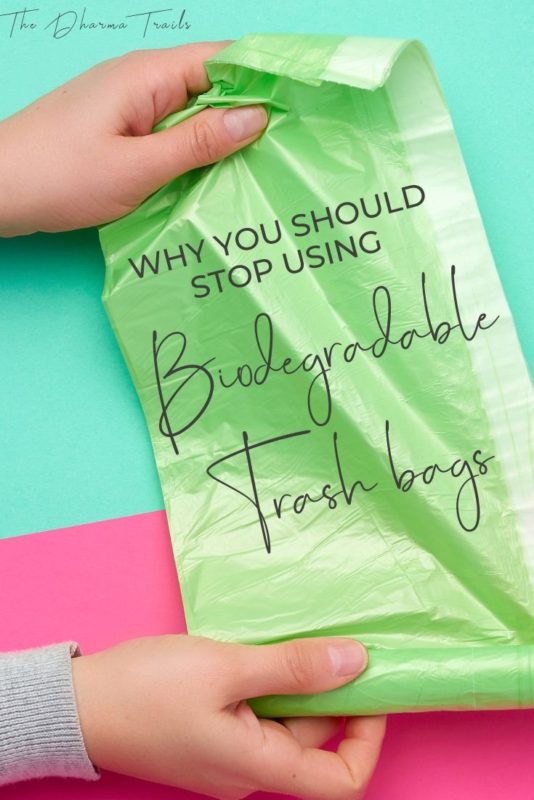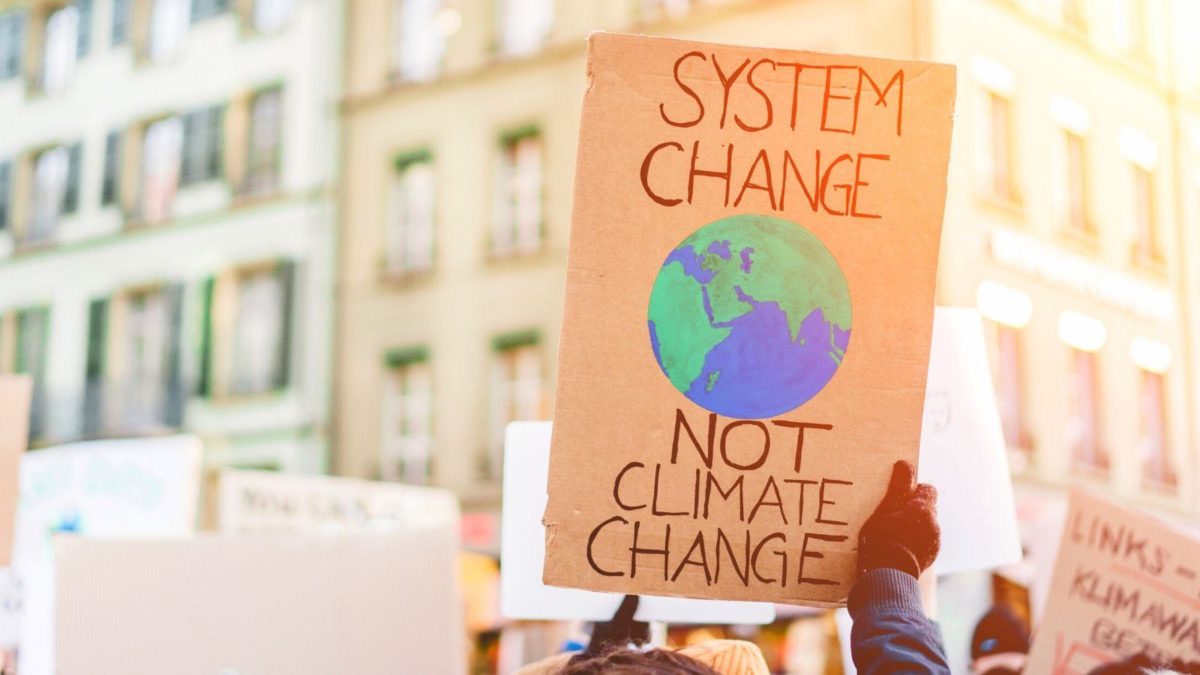What really is a biodegradable trash bag and are they actually a greener option? There are some pretty sneaky ways that brands are getting plastic products sold, using vague and undefinable terminology. This article looks into the terms used to determine if biodegradable trash bags are what they make themselves out to be.
Table of Contents
What is biodegradation?
The word biodegradation is not clearly defined. This is why it gets used frequently and with a lot of confusion. It is a process that includes the breakdown of material by micro-organisms (some kind of living bacteria).
It should be noted that the object breaking down never returns 100% to what it was. Some element of the materials breaking down is absorbed by the microorganism (10%-40%).
In all of the definitions of the term there are a few key words used:
- Organic
- Not harm the environment
- Microorganisms
These terms will be useful when deciding if biodegradable trash bags really fit into the category of “biodegradable”.
Biodegradation Rates
Everything has the potential to biodegrade. It’s all a matter of conditions and time. Things like light, temperature, air, and water play a big role in the rate in way things breakdown. If something takes a million years to biodegrade it is technically “biodegradable”. But is this really a practical or functional use of the word?
Ideal Biodegration Conditions
Can things biodegrade anywhere? If an item lays on the grass or sand or in the sea, will it still biodegrade?
There are optimal conditions for the biodegrading prices to occur. This is in a moist, warm soil where micro-organisms have access to oxygen. This doesn’t mean that things can’t biodegrade in the ocean. There are lots of tiny organisms floating in the sea. The conditions, however, are not ideal.
Why does it matter if things can biodegrade in the sea? Plastics (including biodegradable trash bags) have a high chance of ending up in the ocean.
- Up to 12.7 Million tonnes of plastic enter the ocean each year (equivalent weight of 12 Million Elephants)
- There will be more plastic in the ocean than fish by 2050 (This is based on total weight and fish stocks as per 2015 levels)
Biodegradable vs. Compostable
In the world of biodegradable trash bags, there is also the term “compostable”.
What is the difference? There are few key differences between a biodegradable trash bag and a compostable trash bag.
- Everything is biodegradable over time. Whether that takes hundreds of years or not is irrelevant
- Compost is a final product (a soil conditioner, high in nutrients)
- The act of composting results in the final product, compost
With these points in mind. Calling a bag a “biodegradable trash bag” doesn’t really mean much. A compostable trash bag, on the other hand, has to adhere to a certain final result.
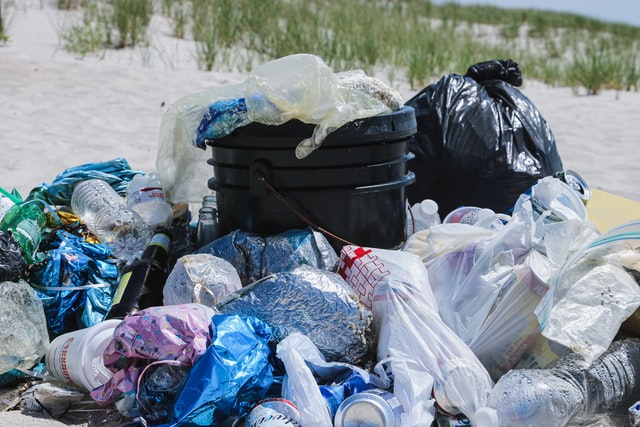
How to qualify as a biodegradable trash bag
There are different rules and regulations of the term and the use of the word around the globe. In California for example, a product that is labeled “degradable”, must break down naturally within a year.
Are compostable trash bags biodegradable?
For any product intended to go to landfill or incinerators, they cannot use the term degradable as it will not break down in a year (no materials breakdown in landfills due to basically suffocating under the weight of more trash – eliminating the oxygen element & therefore the ability to biodegrade with living organisms).
How to qualify as a compostable trash bag
As mentioned, to qualify as compostable, the bag must result (after the composting process) into the final product; compost.
There are two different qualifications of composting (At home and Industrial)
When most people think of composting, they think of a bin or an area in the yard where food scraps break down. This falls under the category “Home Compostable”.
Unfortunately, not all bags are able to achieve this organic breakdown and need the assistance of industrial compost systems. Here materials are mechanically blended and put under high temperatures over time to forcefully compost.
So, while the term “compostable” on a trash bag might look good. The likelihood is, that bag will not make it to the necessary conditions (industrial compost faculty) in order to successfully turn into compost.
Oxo-biodegradable bags
Oxo-biodegerable or Oxo-degrable plastic has a chemical embedded in the material to artificially breakdown the material. However, the problem is that the plastic breaks down into small pieces but never really disappears.
It adds to the micro plastic loading on our environment.
And with no internationally recognized way to test or regulate the term it has been proposed that the products be banned by over 150 organizations worldwide.
What is a biodegradable trash bag?
Companies are in a race to create the best biodegrade trash bags at the lowest costs.
Based on the regulated terms: a biodegrade trash bag is one that can breakdown naturally over some amount of time. The problem with the term biodgerable is that there is no real defined timline set.
Therefore if a biodegradable trash bag simply states that it is “biodegradable”, it is probably worth avoiding.
What are biodegradable trash bags made of?
Biodegradable trash bags can be made from a range of materials including the “traditional” plastic made from petroleum-based chemicals.
There are more and more products out there investing money into “plant-based” plastic. It means that they use the starches from the plants to create the plastic. In this case, almost anything could be turned into plastic. However, it doesn’t mean that the chance of pollution is less. Just that the base fossil fuel is being replaced for a plant.
These are the terms to look out for:
- Degradable = Doesn’t necessarily mean much as everything can theoretically degrade over an infinite amount of time.
- Bio or Plant-Based Plastic = The plastic base is plant-derived instead of fossil fuel-derived. That doesn’t mean that it is easily biodegradable or compostable.
Are biodegradable trash bags good?
Based on the terminology, simply having a “biodegradable trash bag”, is not good enough.
Unfortunately, we’re in a predicament.
- Consumers are wanting better/greener solutions
- Many companies truly want the same
- Many other companies are playing on the sale potential of the new “green” interest
- Marketing a product as a “greener” option makes it more desirable for consumers
- Companies can use this marketing potential to direct sales to products that are not necessarily green
In summary, a trash bag labeled only as degradable or biodegradable is not good enough
If you are looking for a truly biodegradable trash bag option, you have to look for one that is compostable.
And, not only “compostable” but “home compostable“.
Home Compostable Trash Bags
There is currently no international standard specifying the conditions for home composting of biodegradable plastics.
There are national standards that exists, like the following:
- Australian – AS 5810 “Biodegradable plastics – biodegradable plastics suitable for home composting”
- Belgium/France – NF T 51-800 “Specifications for plastics suitable for home composting”
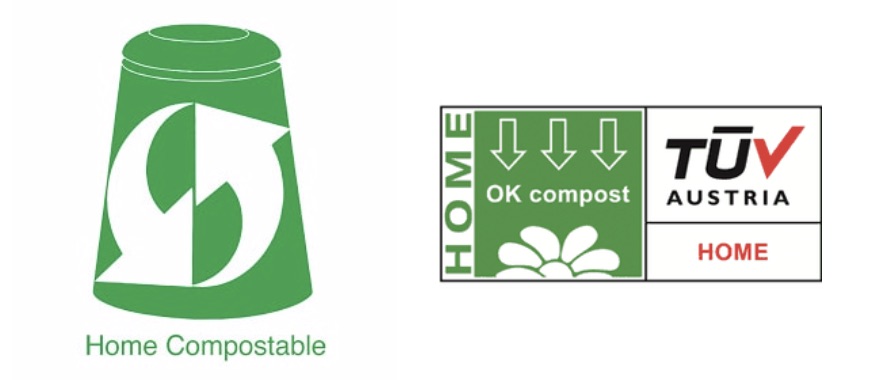
Home composting quality is what you’re really looking for if you want to make the environmental choice on a trash bag.
The theory is that the bag will break down at roughly the same rate as the waste inside the bag. Therefore the bag really is just a temporary product to get the waste from point A (your bin) to point B (where the trash will compost).
Remember: anything going into landfills will not compost or degrade. So home composting literally means at your home.
And let’s face it. If you are composting at home, do you really need to put the trash into a bag beforehand? Can’t you just put compostable items directly into your compost pile?
It’s all about the wind
So, what’s the point of putting your waste into a home compostable trash bag if it’s going to the landfill and not going to be composted?
One of the biggest reasons might sound contradictory.
Bags are easily destroyed, therefore you need one that could breakdown quickly. When piles of trash bags are dumped into a landfill, big machines push piles around and drive over bags. Trash bags rip easily under the force of any kind of machine (no matter what brand or type you buy).
Wind picks up small pieces of torn plastic bags and can take the pieces into our environment. This is where real damage occurs. If something needs to be in a plastic bag. We want it to be able to decompose as quickly as possible in natural conditions.
What’s the best way to ensure these plastic scraps don’t go flying into the environment?
What can I use to replace plastic trash bags
The best way to reduce your plastic waste and the potential for environmental pollution is to Say No to Plastic!
That’s right, you don’t actually need a bin liner. We haven’t used one for the last couple of years. The best plastic bag alternative for your trash or bin is no bag.
If you’re aiming towards a zero-waste kitchen, here are 5 things you can do to replace your biodegradable trash bags:
- Shop with a plastic bag alternative (click here for ideas)
- Separate organics and nonorganics when preparing food
- Place organics in a bowl (keep in fridge) or in your countertop compost bin
- Rinse off your plastic waste/wrapping/packaging, place into your bin (without a bag)
- Empty the organic waste into compost when full (with your own, a friends, or a community one). Otherwise, find a good natural area or put it into your curbside bin on bin collection day. Alternatively, try making a compost smoothie!
- Bonus Tip – you can use old newspaper to line a bin if you really want. Otherwise, just rinse out your bin as needed.
Biodegradable Definitions
Here are some Biodegradable definitions, for your information, just to see how variable they are.
(Of a substance or chemical) to change back, by the action of bacteria, to a natural state that will not harm the environment.
Oxford Dictionary
Degradation caused by enzymatic process resulting from the action of cells
International Union of Pure and Applied Chemistry (IUPAC)
The destruction of organic compounds by microorganisms
Department of Soil and Environmental Sciences, University of California, Biodegradation.
Biodegrable Trash Bag Summary
In summary, biodegrade trash bags are adding to the unnescary waste load of our planet.
- The term “degradable” is not really relevant and not even recognized in some places as a valid classification
- You don’t need to have a bin liner for your trash
- The best way to be eco friendly is to
- buy less packaged goods (reduces waste)
- shop with a reusable bag (reduces waste)
- compost at home (or find a community compost to contribute to)
Like This Article? Pin It!

Aaron is one of the co-founders of The Dharma Trails. His background in marine eco tourism and writing have blended together to create the eco travel platform read by users around the world.

